|
|
|
Sort Order |
|
|
|
Items / Page
|
|
|
|
|
|
|
| Srl | Item |
| 1 |
ID:
162453


|
|
|
|
|
| Summary/Abstract |
Can developmental aid bring peace to war-torn communities? The current literature is divided on this issue. One line of reasoning suggests that aid is likely to decrease violence by improving employment and prosperity, thereby making participation in conflict more costly. Another view cites evidence showing an association between aid projects and increased insurgent activity. Addressing this contradiction, we argue that different types of aid projects lead to different outcomes, as some projects foster an unequal distribution of benefits within communities. Our reasoning draws on qualitative accounts from conflict zones, recent research on how grievances associated with exclusion can foster civil war onset, and experimental findings regarding perceived inequity and punishment. Building on this scholarship, we use a recently developed event-matching methodology to offer insight from contemporary Afghanistan. Aid projects that tend to exclude portions of the community yield more insurgent activity in their wake than more inclusive projects. These results shed light on why some aid projects reduce violence while others do not, emphasizing that efforts to ‘win hearts and minds’ can be a source of both contentment and contestation.
|
|
|
|
|
|
|
|
|
|
|
|
|
|
|
|
| 2 |
ID:
186483
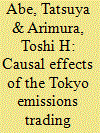

|
|
|
|
|
| Summary/Abstract |
The Tokyo emissions trading scheme (ETS) is the first regional ETS in Japan, where a national ETS has not been introduced. In this study, we estimate the policy impacts of the Tokyo ETS on energy usage and economic activities during the scheme’s first phase (2010–2014) and the first four years of its second phase (2015–2018) using business establishment-level panel data from 2007 to 2018. From the matching-based difference-in-differences (DID) estimation results, we find that while regulated business establishments reduced their energy usage beyond their reduction targets set by ETS regulation, the unregulated business establishments chosen by the matching strategy as a comparison group also decreased their energy usage to the same extent. Additionally, the Tokyo ETS did not have a negative impact on the economic activities of regulated business establishments during phases I and II. These results suggest that the emissions cap levels in each phase may not have been sufficiently demanding to induce regulated business establishments to implement additional energy use reduction practices.
|
|
|
|
|
|
|
|
|
|
|
|
|
|
|
|
| 3 |
ID:
107928


|
|
|
|
|
| Publication |
2011.
|
| Summary/Abstract |
The relationship between conflict and education has been studied before. However, previous authors have always focused strongly on the supply-side effects, whereas this article examines the influence of conflict on the demand for education. It is theoretically shown that, under relatively general conditions, individuals living in a conflict area have an incentive to increase their level of education and that this effect depends on the individual's skill level. This hypothesis is tested using the conflict in the Basque Region as a case study, which is an example of a conflict in which one would not expect strong supply-side effects. Using other Spanish regions, an artificial region is created in which the population has a similar educational distribution as in the Basque Region. When comparing the true and artificial regions, individuals with a medium education level clearly show an increase in education during the conflict, as predicted by the theoretical model.
|
|
|
|
|
|
|
|
|
|
|
|
|
|
|
|
| 4 |
ID:
181145
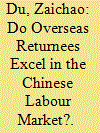

|
|
|
|
|
| Summary/Abstract |
Overseas study is a global phenomenon and a major business internationally. But does overseas study pay off? Using data from the 2015 China Household Finance Survey (CHFS), we examine the labour market performance of overseas returnees in China. To obtain more accurate results, we matched each returnee with a local so that the domestic group is as similar as possible to the returnee group. We then conducted empirical analyses of the matched data. We find that compared with domestic postgraduates, returnee postgraduates earn about 20 per cent more annually. Moreover, the salary premiums paid for foreign graduate degrees can be attributed principally to the superior human capital gained from overseas education rather than from any “signalling” effect. Also, returnees with graduate degrees are more likely to enter high-income professions and foreign-funded ventures, and to reach higher positions in those organizations. However, we find no significant differences in income, occupation choices and positions between returnee and local bachelor's degree recipients. As such, we suggest that Chinese students and their families are best served when the students obtain a local undergraduate degree and then go overseas for graduate training.
|
|
|
|
|
|
|
|
|
|
|
|
|
|
|
|
| 5 |
ID:
088414
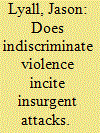

|
|
|
|
|
| Publication |
2009.
|
| Summary/Abstract |
Does a state's use of indiscriminate violence incite insurgent attacks? To date, most existing theories and empirical studies have concluded that such violence is highly counterproductive because it creates new grievances while forcing victims to seek security, if not safety, in rebel arms. This proposition is tested using Russian artillery fire in Chechnya (2000 to 2005) to estimate indiscriminate violence's effect on subsequent patterns of insurgent attacks across matched pairs of similar shelled and nonshelled villages. The findings are counterintuitive. Shelled villages experience a 24 percent reduction in posttreatment mean insurgent attacks relative to control villages. In addition, commonly cited "triggers" for insurgent retaliation, including the lethality and destructiveness of indiscriminate violence, are either negatively correlated with insurgent attacks or statistically insignificant.
|
|
|
|
|
|
|
|
|
|
|
|
|
|
|
|
| 6 |
ID:
192877
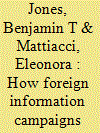

|
|
|
|
|
| Summary/Abstract |
Governments involved in civil wars often seek to shape foreign perceptions of the conflict and of the government’s role in the conflict. To this end, for example, many such governments have engaged in public diplomacy campaigns (PDCs) in the United States since the end of the Cold War. Specifically, these governments have hired US public relations (PR) and lobbying firms to present favorable narratives of themselves and their role in the conflict. Through PDCs, governments seek to shape US public pronouncements about the governments and the conflict itself. Are PDCs effective tools to reach this goal? We argue that the effect of PDCs is divergent. PDCs help mobilize both supporters and opponents of the sponsoring governments. In so doing, PDCs increase both positive and negative public statements from US officials toward the civil war government. We compile data on PDCs in the United States since the end of the Cold War. Our results have implications for research on foreign influence in foreign policy, combatants’ moral hazard, and international norms about combatant behavior. Moreover, in order to gauge the influence of foreign actors on domestic narratives of civil wars, it is crucial to consider how such foreign actors can indirectly shape the discourse around conflict by mobilizing domestic factions.
|
|
|
|
|
|
|
|
|
|
|
|
|
|
|
|
| 7 |
ID:
147626


|
|
|
|
|
| Summary/Abstract |
We investigate the effects of on-the-job training on firm productivity and wages using a large panel data set constituted of all large and medium size manufacturing firms in China over 2003–2007. We estimate firm productivity carefully with a recent semiparametric method and combine the propensity score matching and the difference-in-differences techniques to estimate the treatment effect of training. We find consistent evidence that i) training helps boost firm productivity and wages; ii) the higher the training expenditure per capita, the higher the increase in productivity and wages; iii) firms benefit more from training than workers. These findings are not sensitive to industrial capital intensity or firm ownership structure.
|
|
|
|
|
|
|
|
|
|
|
|
|
|
|
|
| 8 |
ID:
123336


|
|
|
|
|
| Publication |
2013.
|
| Summary/Abstract |
This article presents new evidence on urban-rural migrant wage differentials of workers in full-time employment in China. It utilises a nationally representative data set, recent matching techniques, and IV estimation methods to evaluate conditional and unconditional quantile treatment effects for education and for migrant status. Particular attention is paid to rural-migrant wage differentials and the migration effect on earnings. The evidence indicates that (1) the returns to education are significant, especially when we account for endogeneity; (2) long-term migrants seem disadvantaged, mainly due to endowment effects, and (3) the urban-rural migrant wage gap completely disappears when matching or IV methods are employed to account for endogeneity in education.
|
|
|
|
|
|
|
|
|
|
|
|
|
|
|
|
| 9 |
ID:
112780
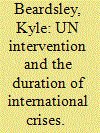

|
|
|
|
|
| Publication |
2012.
|
| Summary/Abstract |
This article examines the effect of UN actions on the duration of international crises. Four different types of action - assurance, diplomatic engagement, military involvement, and intimidation - and three different outcomes - compromise, victory, and stalemate - are considered. After building on the existing literature to develop expectations of how a third party like the UN shapes crisis trajectories, hypotheses are tested using the International Crisis Behavior (ICB) data and a new events dataset on UN activity. Results from competing-risks models reveal that UN military involvement does well to decrease the risk of one side achieving victory, and diplomatic engagement increases the ability of the belligerents to reach a compromise in the long run. Moreover, diplomatic engagement accompanied by military involvement substantially hastens the pace of stalemate outcomes. Both tactics, however, have some trade-offs. Military involvement can decrease the sense of urgency for compromise; diplomatic engagement can be used for insincere motives and increase the risk of one-sided victory over time. UN actions of assurance and simple intimidation have considerable shortcomings as crisis management vehicles.
|
|
|
|
|
|
|
|
|
|
|
|
|
|
|
|
|
|
|
|
|